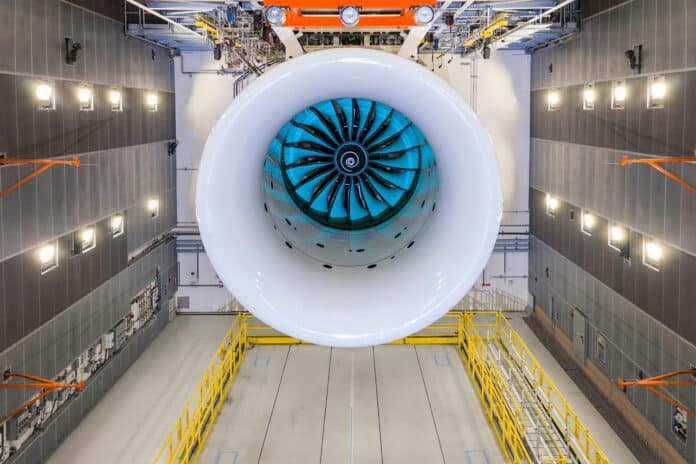Rolls-Royce has achieved a major milestone in its efforts to reduce the environmental impact of aviation. The British luxury carmaker announced that it has successfully run its UltraFan technology demonstrator to maximum power on 100% Sustainable Aviation Fuel (SAF) at its facility in Derby, UK.
The aerospace industry is facing growing demands to develop technology that is both more efficient and environmentally friendly. This is why it is important that a major player like Rolls-Royce adopts something like SAF across an entire product range.
The UltraFan is billed as the largest and most powerful jet engine in the world, containing a suite of new technologies that deliver greater fuel efficiency, which in turn means lower emissions and greater sustainability. The demonstrator has a 140-inch (356-cm) fan diameter and can produce 64 MW of power.
It has achieved a maximum thrust of over 85,000 lbs in static tests. The technology can be adapted to create an engine with a thrust range of 25,000lb to 110,000lb for narrowbody or widebody aircraft that may be developed from the 2030s.
The demonstrator features carbon composite titanium fan blades with a titanium leading edge and a composite casing – the combination that reduces the weight of the overall fan system, helping to create additional fuel burn efficiency.
UltraFan delivers a 10% efficiency improvement over its Trent XWB, which is already the world’s most efficient large aero-engine in service. In total, that’s a 25% efficiency gain since the launch of the first Trent engine. Also, the demonstrator cuts down noise by a remarkable 35%, virtually eliminates particulate emissions, and reduces NOx emissions by about 40% at cruise.
The company says as part of the UltraFan development program, it has identified a number of technologies that are potentially transferable to its current Trent engines, which will provide their customers with even greater availability, reliability, and efficiency.
All of these engines have been certified to run on 100% sustainable aviation fuel (SAF). The BR710 business jet engine is the latest one to achieve this certification after being tested in Canada. Other certified engines are the Trent 700, Trent 800, Trent 900, Trent 1000, Trent XWB-84, Trent XWB-97, Trent 7000, BR725, Pearl 700, Pearl 15, and Pearl 10X.
Virgin Atlantic’s Boeing 787 Dreamliner, powered by Rolls-Royce Trent 1000 engines, is scheduled to make the world’s first transatlantic flight fueled entirely by SAF. This will demonstrate the feasibility and safety of using SAF without blending it with conventional jet fuel, as the current international standards require. The test flight and other static demonstrations aim to show that the technical challenges have been solved and that SAF can be used more widely in the future.
“We estimate that to reach Net Zero flying by 2050, a combination of highly efficient, latest-generation gas turbines such as UltraFan operating on 100% SAF is likely to contribute around 80% of the total solution, which is why today’s announcement is such an important milestone for Rolls-Royce and the wider industry,” said Simon Burr, Group Director of Engineering, Technology and Safety, Rolls-Royce.
